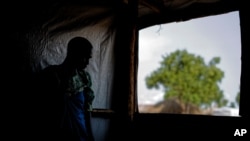A new report says South Sudanese journalists, rights activists and opposition members living outside the country are still at risk of being harassed and even killed by South Sudanese authorities, most notably by the National Security Service (NSS) intelligence agency.
The 43-page report, “No Refuge: South Sudan's Targeting of Refugee Human Rights Defenders,” was compiled by Ireland-based rights group Front Line Defenders and contains testimonies from 14 South Sudanese human rights defenders living in Kenya, Uganda and Tanzania.
Adam Shapiro is the Frontline Defenders head of communications. He told VOA’s South Sudan in Focus that when human rights defenders leave South Sudan to seek refuge, there is no guarantee of safety for them.
“The picture painted by the research leaves no doubt. South Sudan’s NSS is able, and more than willing, to try to silence civil society even when human rights defenders leave South Sudan. The agency is responsible for the creation of a climate of fear and distrust among refugee human rights defenders in neighboring countries,” Shapiro said.
The report documents instances of surveillance, both digital and physical; disruption of peaceful activities; attempts to kidnap and deport human rights defenders to South Sudan; and the sharing of information with South Sudan embassy personnel, for the alleged objective of targeting those activists.
South Sudan in Focus reached out to government officials for reaction to the report but did not get a response.
In perhaps the most notorious case, human rights lawyer Samuel Dong Luak and opposition member Aggrey Idri Ezbon were kidnapped in Nairobi in 2017. A 2019 U.N. report said the abductions were carried out by South Sudan’s Internal Security Bureau. The report said Luak and Ezbon were flown to Juba and executed – something the South Sudanese government has repeatedly denied.
In January 2020, the U.S. Department of the Treasury sanctioned Taban Deng, one of South Sudan’s vice presidents, for his alleged involvement in the case. It said Deng reportedly arranged for Luak and Ezbon’s disappearance and deaths.
Shapiro says the international community has a role to play by reminding South Sudan’s government of its core responsibility to protect its citizens against all forms of abuses in the country. He says the Front Line Defenders will engage South Sudanese diplomatic missions abroad, as well as authorities in Kenya and Uganda where South Sudanese rights activists have faced attacks.
"We do believe that the government of South Sudan has obviously the responsibility to protect and guard the human rights of its citizens, but also to ensure that human rights defenders and civil society in the country can operate freely and carry out their work without fear of reprisal, intimidation, harassment, abuse and imprisonment,” he said.
In the past, South Sudan’s senior government and military officials have dismissed reports of serious human rights violations committed by some members of the NSS and the South Sudan People’s Defense Force (SSPDF), which is the national army.
"If you believe the [South Sudan] authorities, everything is copacetic, everything is fine and well in South Sudan and nobody should have any complaints. We know that is not true, we have documented, other organizations have documented, and the U.N. has documented what is going on in South Sudan," Shapiro said.
On Wednesday, the United Nations Human Rights Council renewed the mandate of the commission on Human Rights in South Sudan. Several international rights watchdog groups have praised the move to extend the mandate of the commission for another year.
Nyagoah Tut Pur is Human Rights Watch's researcher for South Sudan. She says the international community must continue to report the atrocities committed against civilians in South Sudan.
"The renewal of U.N. Commission of the Human Rights in South Sudan’s robust investigatory mandate is key to ensuring accountability for grave violations in South Sudan and ending the ongoing cycles of abuse,” Pur told VOA.
South Sudan Government Threatens Rights Activists Living Abroad, Report Says
